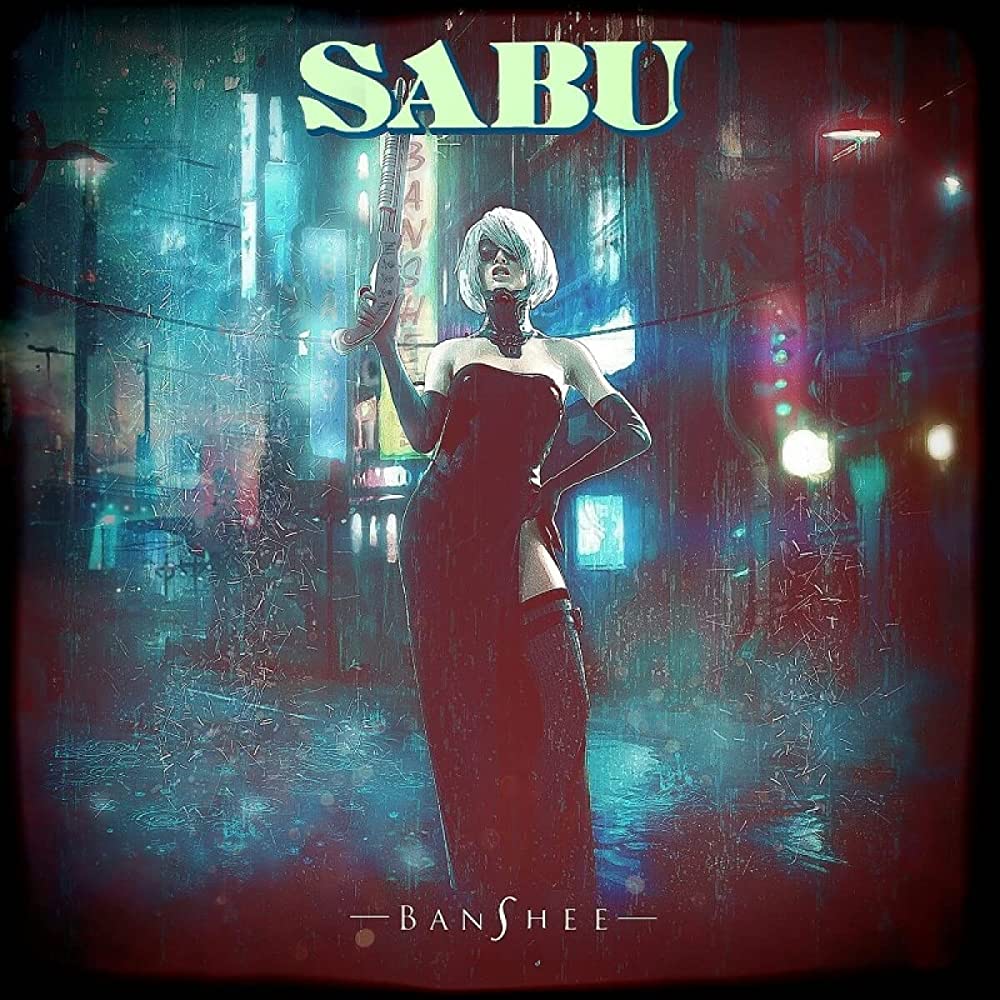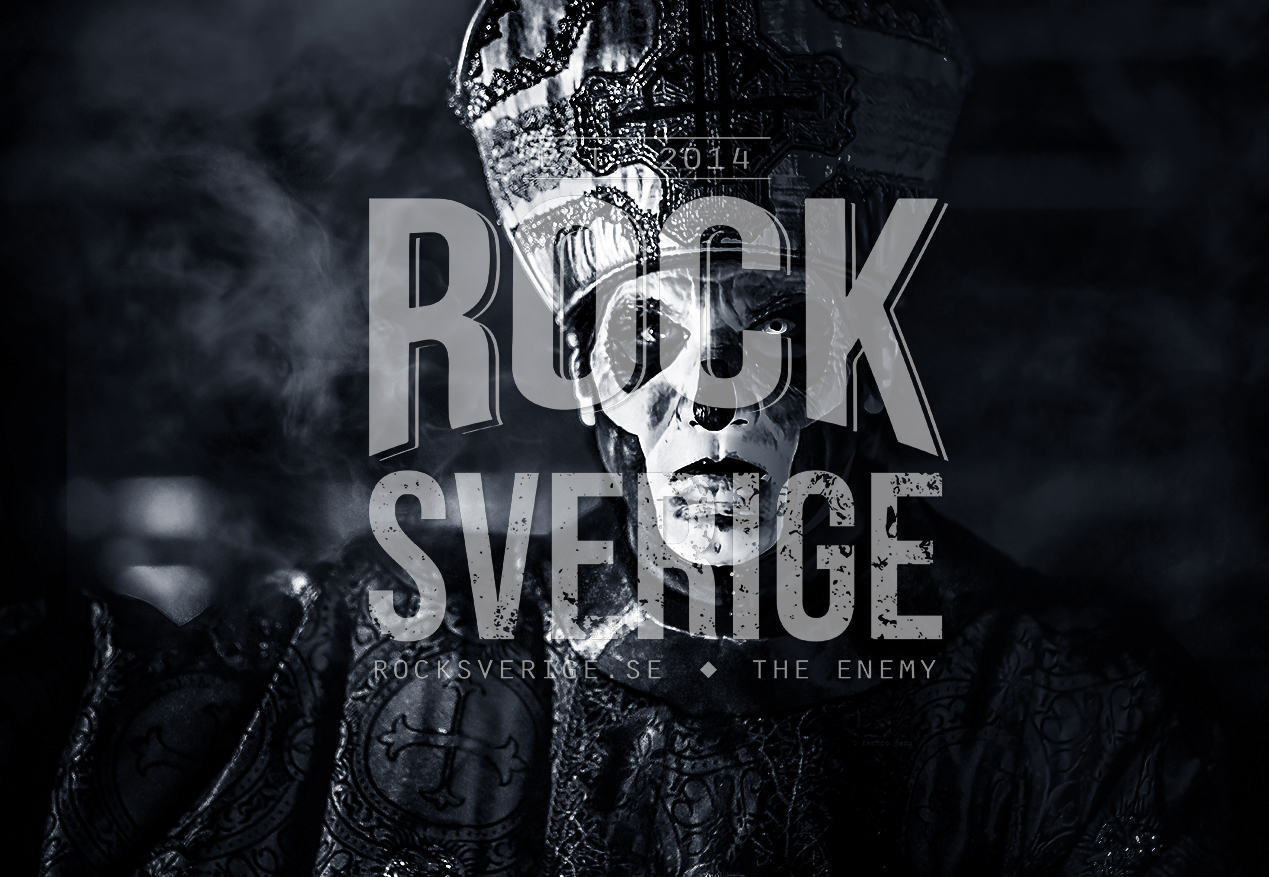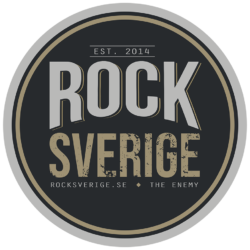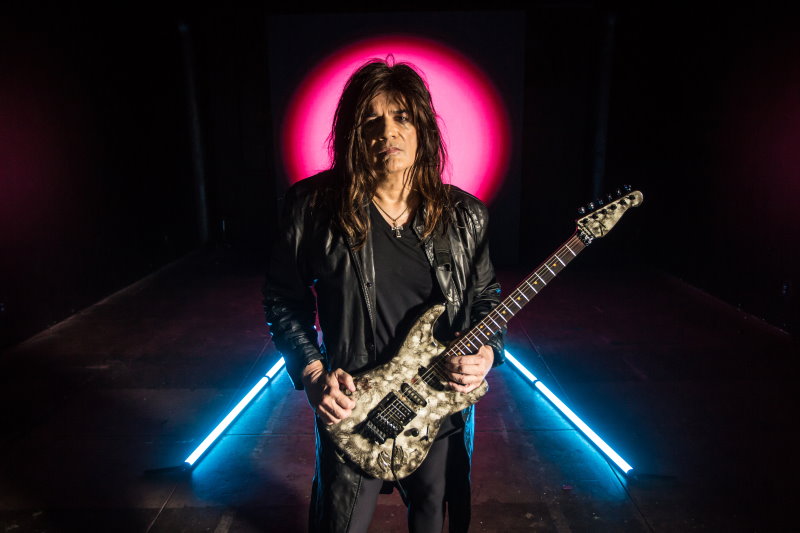Paul Sabu gav i redaktörens tycke ut ett av 80-talets bästa album, “Heartbreak” Sedan dess har han gjort allt möjligt, men samtidigt varit tämligen anonym för den större massan. Ett nytt album, “Banshee”, släpptes på Frontiers i slutet av förra året. I vårt samtal med herr Sabu pratar vi om hur musikindustrin förändrats, om tiden då han arbetade med KISS, albumet “Heartbreak” och hur Shania Twain kom att träffa megaproducenten Mutt Lange:
– She wanted to get out of the gig she was in and I said “If you want to do something, marry Mutt Lange!” She´d never heard of him, but I said “Look him up, find him, marry him!” The other thing is… the coolest place I´ve ever been to in my life was Lausanne in Switzerland and guess where she moves?

You´ve been in the music business for so long now, as a musician and as a producer. How do you look at the way things have changed throughout the years, from the early 80´s up to today?
I started when I was 19 so I was kind of raised in the music business. It wasn´t like a I bought a book and read or anything like that. When you´re 19 and seeing this stuff for the first time… I mean, back then there was tons of money and it seemed like everybody was having a much better time than they are now. Everybody was getting paid for stuff. Before it got into the 80´s I was playing clubs with fake id´s and I would have done anything to get signed. I would´ve played polka music or whatever. It was just one of those things where one guy came in and saw me and asked “Do you want to get signed?” and I said “Yeah!” ha ha ha. There wasn´t a lot of thought put into it, but it turned out to be a good deal and it got things going for me. As it progressed, the music business got really green and it was still good by the 90´s, but from 93 or something like that, everything changed. We put out Only Child in 1988 and the Capitol/Rhino thing we had was folding and I didn´t even know about it. One day it was there and the next day half the staff was changed and it was bought out. Even back then it was happening. When I was working for Geffen, I didn´t know that Universal had bought Geffen 14 years before they actually changed it. All these things were in the making. Universal was the big company and nobody knew it. BMG went to Universal, Ariola, you name it. Every label there was from Atlantic on, they were all bought by Universal ages ago. What happened was that when Universal bought everything, they bought the assets, but they didn´t buy the deficits. In other words, they would buy the artist, but they wouldn´t pay the artist. They weren´t going to pay the royalty parts or anything like that, so all the artists started getting no money. I got a publisher, Gerard Talbot, one of the best guys that I´ve known and he was actually, two years ago, still working on getting Black Sabbath´s catalog paid for, just everybody. Foreigner hadn´t been paid since, I think, day one, and he was trying to sort that out. I remember going to his studio in the Valley and in the front office, which was just a big room and there were maybe three people handling like Bryan Adam´s solely just so they could get paid. A massive office with a lot of people, but only for a couple of artists. They were working diligently day and night to get these people paid. Then when the warehouse burnt down (2008) and everybody´s stuff went, even Rodney Dangerfield who I love, was burnt, then everybody, Like Paul McCartney, Bryan Adams, Sting got together and tried to sue Universal for all the tapes being gone. Everybody got together to do this and everybody lost. Believe it or not, I was in there too. Some of the albums I´ve done with other people. I joined in and lost my ass too. I´m not sure who made all the money from us losing our ass. Not only did we not get any royalties, but we paid for not getting any royalties. I don´t think the music business has ever been an upstanding business, but it was ok as long as you got paid. It´s one of those things where there´s and acceptable amount of screwing and you can get screwed so much, but if it made you enough money it was ok. As far as my career goes, the 80´s were pretty good and even into the 90´s because I had made a lot of friends and there are always people wanting to work on projects even though the budget used to be $250.000 or higher and then it went down to about $70.000 in the 90´s and then it was like $7.000 and now it´s probably down to $7. Then the digital thing happened and I had learned analog my whole career and I mixed more records than you can believe, but all I did was that. I´m not a workaholic but I love to work. It just took you by surprise and I had to learn everything all over again and the digital age is weird because the only thing that you pay for is how to sound analog. You used to have all these faders and now you have a fucking mouse! What the digital age did do was that you didn´t have to have bands rehearsing together, but I don´t know if that´s a help. With some of these albums, I don´t think the guys can play it from top to bottom. They only play a couple of bars at a time and then they splice it in. I´m the same way, I´ve gotten to be lazy like that. I remember rehearsing six days a week to be good. The only thing I have against digital is the fact that all the people that shouldn´t make records are making records. It´s a great thing, but boy, there´s a couple of things I would change.
What do you remember from putting the “Heartbreak” album together?
The reason I wrote that album was because I was doing this album Kidd Glove. I like it more now than I did when I was doing it. Kidd Glove was a really corporate album. It was very heard to do. It was on a black label that was run by white people because Berry Gordy was in trouble. It was not rocking enough for me. I didn´t realize the finesse of it till later. The thing with “Heartbreak” is that I wrote it out of heartbreak. I was writing it during the time I was doing the Kidd Glove album at night. Kidd Glove could not have been more of a corporate album. I had to audition for the gig and I had to write with certain writers. It was a 9-5 gig and musicians don´t have hours. If you´re working on something and it sounds great, you keep working on it and if it sucks, you quit. When I did “Heartbreak” it was like every bit of blood, sweat and tears went into that album, because I didn´t like the other album. But it may have been that I just didn´t like the people more than what was actually coming out. The “Heartbreak” album was like the first album that I actually tried to engineer. I was always working on stuff. Having engineers making me sound like shit, I went “Shit, I can do this myself!” I watched guys diligently how they did it, so when I was making the album it was an album totally made out of love. When I did the song “Angeline” it was the day after my grandfather died, who actually raised me. I had tears in my eyes half the time when I was singing it. I didn´t relate him to Angeline, it was just a name that was popular back then. Everything about that album was kind of heartbreaking. I was really unhappy with what I was working on at the time and the were some deaths in my family and the only outlet I had was the music. It kept me from going crazy. I do not write because of experiences. I write totally fictional stuff. Very few times I get into things that really has happened. In this particular case I had already started because I simply wanted to get an album out that I loved and I didn´t love what I was doing. That´s kind of how the “Heartbreak” album came about. It wasn´t like I planned it or anything.
Did you tour with that album?
We did Texas and we just used to play a lot. We were either playing or recording. When you play the stuff live you get people´s reaction and you´re watching them and go “This is the song I should not be playing.” And the other time it´s “This is the song I should be playing.” Back in the 80´s people came out to see what you could do or what you couldn´t do right. You had a massive amount of competition within bands, but it was a healthy competition. It wasn´t like a jealousy thing. You just wanted to be the best. There was something about the competition back then that helped. I miss that.
That album came out smack in the middle of the Sunset Strip era. Did you ever work with any of those other bands or were you ever approached by those bands, like Ratt, Mötley Crüe and so on?
No, I kind of started working with people later on. I wasn´t out to be a producer. I just wanted to make music.
You ended up writing with Paul Stanley and Bruce Kulick in 87, right?
I´m taking nothing away from these guys, but they have their own system of writing, which is borrowing a lot of things from other people and paying them off. They buy a lot of things that they like. I didn´t conform to things. I don´t want to say it wrong, because I don´t mean it wrong, but it was like… everything they do was up and up and very generous about everything and it was just not something I was into. To me, fair is like splitting everything 50/50 and you would both work on it. There are many people I could mention, but I won´t… but a lot of people are like “Ok, write the song, let me hear it and if I like I´ll write it with you.” That´s kind of the mentality of many and I´m honestly not too much into that stuff. I usually co-write with a ton of people and I´ve got three albums in the can with Frankie Banali that never came out because his wife doesn´t want them out. You would love it because it´s heavier than shit. We were friends because of playing and that´s the thing that makes it ok to write, because drummers don´t write. Even though we split songs… I wouldn´t have written and had certain ideas had not Frankie been involved. To me, that´s worth a co-writer deal even though someone contributes a lot more. It´s either 50/50 and not who does what and where. We write the song or we don´t write the song and I´m not into writing the song so they can write the song.
Did it end up being a song or anything?
One of them was on the Silent Rage thing and it was a funny album. They say that Gene Simmons produced it, but I´m the guy that rehearsed with them every day. I´m the guy that did the album. Gene takes credit for a lot of things that he never had to do with, but he is the guy that originally puts it together. Gene had his label and he´s a great entertainer and a great bassist, but he should not own a label. He wasted so much money on his label and it went bankrupt. There are people that should do things and there are people that shouldn´t. As business minded as he is you would think that he would know this. The stuff with Paul Stanley was more like writing together and maybe we were going to come up with something, maybe not. I think I´ve got some cassettes believe it or not of he and I writing a couple of songs. We wrote together three times and it´s some cool stuff but I don´t think anything of it came out. Those aren´t the greatest writers that I´ve been with. Not because they´re not good, but they have that mentality of wanting to hear something first before they want to write it, which I actually tried a couple of times and it wasn´t quite right.

On the new album “Banshee” it´s just you and Barry Sparks playing everything. How did that come about?
Barry and I have been in bands together forever and we´re close friends. We were working on something else when we got a call to do the Frontiers gig. Frontiers wanted to sign me for a long time, but somebody didn´t like me over there and then he left so they could sign me. I asked Barry if he wanted to do it and he said yes and that was it. Barry is a super talented guy and he´s got great ideas. The problem with the Frontiers deal was that they wanted an 80´s band and I hadn´t done 80´s stuff in a while. I wrote quite a few songs to get to the songs they picked for the album. The songs that they heard and signed me on never made the album. They heard a few songs and said they loved the stuff and they said “We always thought you were like David Coverdale, but better.” I thought doing another Whietsnakish album was probably not the best idea. I kept writing songs until they were 80´s enough to catch their ear.
Of all the artists you´ve worked with throughout the years, which ahs been the most lucrative deal for you? Was it Shania Twain?
Yeah, that was pretty lucrative. When I first started working with her she was kind of singing “Over the rainbow” and I said “You´ve got to listen to some albums!”, so I gave her Boston and said “This is really good.” and some Starship with Mickey Thomas. If you listen to her sing, her licks are Mickey Thomas licks and that´s were she got it from. She wanted to get out of the gig she was in and I said “If you want to do something, marry Mutt Lange!” She´d never heard of him, but I said “Look him up, find him, marry him!” The other thing is… the coolest place I´ve ever been to in my life was Lausanne in Switzerland and guess where she moves? It was lucrative, but she was not cash up front lucrative, it was sales lucrative. Cash up front is more the stuff I did with Geffen, because the paid a lot up front. As far as royalty wise, she´s up there. In 2018, if you were making $1000 every quarter for one song, in 2022 the same song made 3 cents. The market for streaming has gone down that far. That´s why I hate streaming so much.
Of all the people you´ve worked with, is Prince the most talented guy?
No doubt. I cannot say enough about how talented he was. Besides the showmanship and everything, he was just great at everything, didn´t matter what he did. He could take a keychain and turn it into a song. He was just that talented. As far as the sweetest guy I ever worked with, David Bowie was like… I mean, the first time I met him, I was mixing something and a couple of guys came in and were sitting on the couch and he was one of them and I didn´t even know it. I turned around and said “Oh my god!” and he went “Oh no, don´t stop!” A sweeter guy has never been.
Text: Niclas Müller-Hansen


